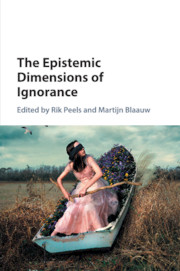Book contents
- The Epistemic Dimensions of Ignorance
- The Epistemic Dimensions of Ignorance
- Copyright page
- Dedication
- Contents
- Introduction
- 1 The Nature of Ignorance: Two Views
- 2 The Varieties of Ignorance
- 3 Ignorance and Incompetence: Linguistic Considerations
- 4 Explicating Ignorance and Doubt: A Possible Worlds Approach
- 5 Ignorance and Epistemic Contextualism1
- 6 Anti-Intellectualism and Ignorance
- 7 Ignorance and Epistemic Value
- 8 Ignorance and the Religious Life
- 9 Epistemic Injustice and the Preservation of Ignorance
- 10 Ignorance and Racial Insensitivity
- References
- Index
- References
References
Published online by Cambridge University Press: 27 January 2017
- The Epistemic Dimensions of Ignorance
- The Epistemic Dimensions of Ignorance
- Copyright page
- Dedication
- Contents
- Introduction
- 1 The Nature of Ignorance: Two Views
- 2 The Varieties of Ignorance
- 3 Ignorance and Incompetence: Linguistic Considerations
- 4 Explicating Ignorance and Doubt: A Possible Worlds Approach
- 5 Ignorance and Epistemic Contextualism1
- 6 Anti-Intellectualism and Ignorance
- 7 Ignorance and Epistemic Value
- 8 Ignorance and the Religious Life
- 9 Epistemic Injustice and the Preservation of Ignorance
- 10 Ignorance and Racial Insensitivity
- References
- Index
- References
- Type
- Chapter
- Information
- The Epistemic Dimensions of Ignorance , pp. 202 - 214Publisher: Cambridge University PressPrint publication year: 2016



